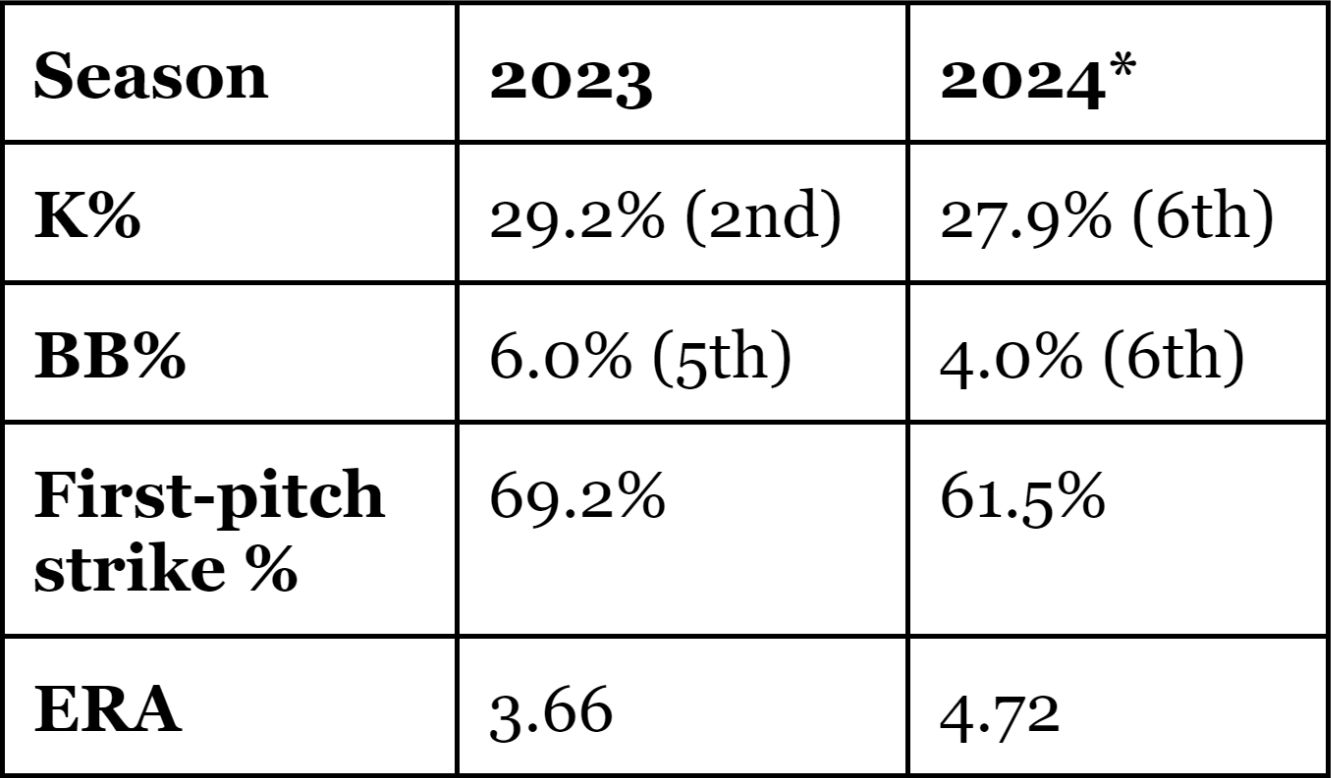MINNEAPOLIS -- It wasn’t always smooth sailing for Pablo López last season, either.
Just about this time last year, López was similarly trying to find ways to limit the balls finding the grass between the fielders behind him and prevent the sorts of outings in which hits and runs come in clusters, even as his underlying metrics suggested he should be pitching much more effectively than the results should show.
But once again, the results are eluding him -- and another frustrating downswing for the Twins’ Opening Day starter continued as he allowed six earned runs and two Corey Seager homers in a 6-2 loss to the Rangers on Sunday at Target Field that halted a four-game Twins winning streak and marked a third consecutive losing effort by López.
The thing is, he doesn’t quite seem to know how to fix this.
“It makes me mad more than anything,” López said. “I haven’t been giving the team length or quality innings or good performances to keep them going. It’s a matter of making adjustments. I’m still not sure what that could be. I do know that something needs to change, and hopefully it happens quicker rather than later.”
But perhaps, there’s not actually a ton to be fixed -- dissatisfying as that may sound to those looking for something to blame -- and that was the sentiment expressed by pitching coach Pete Maki following the game.
Coupled with Monday’s start against the Nationals in which López allowed seven earned runs in five frames, López has allowed six or more earned runs in consecutive starts for the first time in his career, with two homers allowed in each of those appearances. His season ERA stands at 5.25 after he allowed six runs on seven hits in 4 2/3 innings on Sunday.
But that’s where López finds himself caught in the battle that so often seizes baseball discourse in the modern day: As far as the wins and losses go (and as far as those outside the clubhouse are concerned), this is a results-based industry, and he’s falling short there; but as far as the predictive elements go, there’s belief that he’s largely doing things right.
“It's not easy to be giving up runs, right?” Maki said. “But he's doing a lot of things right now that lead to not giving up runs, i.e., he's not putting guys on for free, he's making guys swing and miss, and over time, that leads to less runs being given up.”
By and large, the things the Twins look at are that López is striking out lots of hitters, which helps reduce batted-ball variance. He’s also not beating himself with too many walks, which keeps him on the attack and not on his heels. He’s doing those things at comparable or better rates than last season, when he established himself as this team’s ace.
López, year by year (AL rank):

Again, these aren’t the things that directly translate to wins and losses and counting stats, but over the course of a long, 162-game season, these are the indicators that lead the Twins to believe that López’s luck should even out.
Perhaps the one indicator to look at is that López isn’t getting ahead early in counts as often -- but Maki indicated that landing López’s offspeed pitches for strikes was an issue earlier in the year that has since improved, which leaves them less concerned there, especially since he’s walking batters at a lower clip than last season, anyway.
It’s the variance that got to López on Sunday, when the rare free bases he did allow -- a Marcus Semien walk in the third inning and a leadoff hit-by-pitch to Adolis García in the fourth -- were both cashed in with run-scoring knocks.
“Obviously, the results are not there, but it’s something that might prevent me from firing the alarms and thinking that I have to change too much,” López said. “I’ve just got to stick through the process. I’ve just got to keep challenging people.”
And again, he got through this last year, too -- and Maki sees a lot of parallels there. After López’s ERA peaked at 4.54 following his June 1 start, he pitched to a 3.15 ERA the rest of the way.
“It's just where mental toughness really matters,” Maki said. “Just knowing that if he continues to get count leverage and continues to make them swing the bat to get on base, we feel good about where he's at.”



